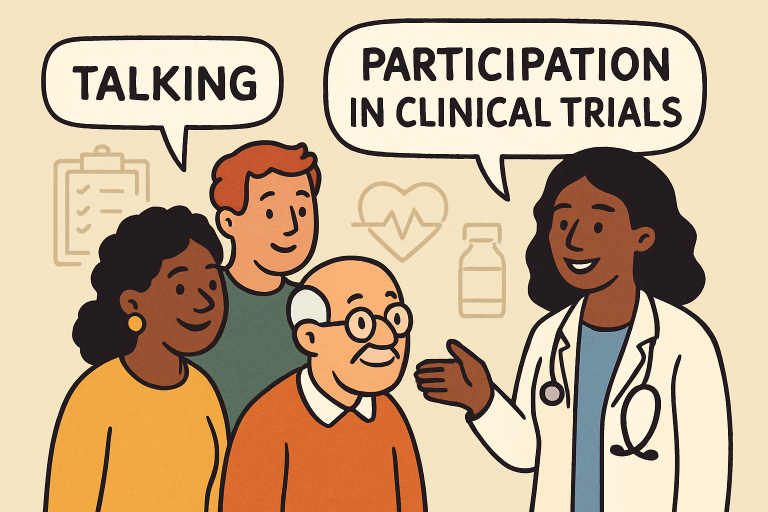Participating in clinical trials lets individuals help advance medicine and access new treatments early. These studies are vital for healthcare innovation, offering insights into new drugs, devices, and therapies. Participants also contribute to discoveries that can improve future medical outcomes worldwide. Every volunteer helps researchers move toward breakthroughs that treat conditions and create a healthier future.
Clinical trials are the foundation of innovation in medicine, driving progress from laboratory discoveries to life-changing treatments that impact millions. By enrolling in these important studies, individuals play a direct and vital role in advancing scientific knowledge and improving care for both current and future generations. Whether you are seeking new treatment options to address health concerns or simply want to contribute to vital medical breakthroughs, understanding more about clinical research and trials can empower you to make an informed decision about participation. Guiding people through the process, clinical trials provide hope, foster new discoveries, and lay the groundwork for tomorrow’s healthcare advances.
The process of joining a clinical trial is accessible to more people now than ever before, with increased awareness and ongoing efforts by the research community to create more inclusive and diverse research environments. Clinical trials not only benefit individual participants through potential access to innovative health advancements, but they also collectively shape the trajectory of medicine as a whole. Greater awareness of clinical trials, including their true purpose and transparent process, can encourage more people to help pave the way toward better healthcare solutions, ensuring more effective and equitable therapies become available for everyone.
Understanding Clinical Trials
Clinical trials are systematic, carefully controlled investigations involving people, designed to answer essential questions about new medical interventions—whether they are new drugs, innovative devices, advanced surgical procedures, or even behavioral changes. These studies are highly structured, with each stage designed to collect accurate and valuable data. Trials progress through well-defined phases, starting with small groups to assess safety and gradually expanding to larger numbers in order to determine effectiveness and gather more comprehensive safety data over time.
Each trial phase is designed with a specific scientific and clinical goal: Phase I focuses on determining safety and establishing dosage ranges; Phase II gathers data on how well the treatment works, as well as additional safety information and possible side effects; Phase III compares the new approach to current gold-standard treatments on a much larger scale, seeking regulatory approval upon success; and Phase IV studies long-term impacts and benefits after the treatment becomes available to the public. All trials are subject to rigorous oversight by regulatory bodies and ethics boards, which ensure participant well-being and uphold strict ethical standards.
Benefits of Participation
Enrolling in a clinical trial offers several valuable advantages, both individual and societal. Participants are often among the first to receive advanced medical treatments and expert care, sometimes years before such therapies become available to the broader public. Many trials provide comprehensive health checks, detailed diagnostics, and continuous monitoring, often at no cost to the participant. This extra level of medical oversight can uncover previously undetected health concerns or ensure that existing conditions are managed as effectively as possible. For some, clinical trial participation represents the best or only hope for managing rare, difficult, or previously untreatable conditions.
Beyond personal benefits, participation in clinical trials is a meaningful contribution to the wider community. Each individual’s involvement adds to a collective database of scientific knowledge that directly informs the safe development of new therapies and future healthcare guidelines. This role is especially important for medical conditions where few treatments exist or for populations that have historically been underrepresented in research studies. By diversifying clinical trial enrollment, participants help ensure that new treatments are safer and more effective for all people, regardless of age, background, or health status.
How to Get Involved
Starting your journey toward participation often begins with a conversation with your healthcare provider, who can help you identify clinical trials relevant to your health needs and assess your eligibility based on your health history and current conditions. Many hospitals, clinics, and research institutions maintain lists of ongoing studies and can recommend options for which you may qualify.
In addition to physician guidance, comprehensive online databases allow individuals to search for studies by disease, location, intervention, or targeted demographic. This searchable information puts trial opportunities within reach for anyone who wants to help advance medical research. Patient advocacy organizations, local hospitals, and public health resources are also valuable for navigating the journey, providing practical help on eligibility, how to enroll, and what to expect throughout participation.

Addressing Common Concerns
Deciding to join a clinical trial is a personal choice that may raise questions about health risks, placebos, or practical issues like time and travel. All research follows strict protocols designed to ensure safety, reduce risk, and meet ethical standards. Participants undergo an informed consent process, where benefits, procedures, risks, and the right to withdraw are clearly explained. Open communication is maintained throughout, with the research team available to clarify, update, and support participants, fostering trust and a partnership that upholds ethical research and scientific progress.
The Future of Clinical Trials
Ongoing innovations are transforming clinical research. Digital health platforms, at-home devices, telemedicine, and virtual trials make participation safer, flexible, and accessible, especially for rural, underserved, or less mobile individuals. Participants can often complete activities remotely, reducing travel and improving retention. Emphasizing diversity promotes fairness and enhances research validity, as studies involving varied backgrounds better represent the population. As technology and collaboration grow, trials will improve in design, safety, and effectiveness, leading to a safer, precise, and inclusive healthcare future.
Conclusion
Clinical trials are more than scientific studies—they bridge medical innovation and real-world patient care. By participating, individuals gain access to advanced treatments and attentive care and contribute to discoveries that shape the future of healthcare. While questions and concerns are natural, rigorous safeguards and ongoing innovations continue to make clinical trials safer, more inclusive, and more accessible than ever before. Ultimately, these studies represent a collective effort: patients, researchers, and communities working together to advance medicine, expand treatment options, and build a healthier future for future generations.








